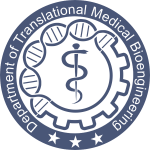The department supports high education by providing a highly interdisciplinary framework for bachelor’s, master’s and PhD training programs within both classical and newly emerging areas in the biomedical sciences. Our department consists of following programs:
- “Regenerative & Biopharmaceutical Engineering” (bachelor’s & master’s programs);
- “Biomedical Engineering” (PhD program);
- “Applied Biology” (PhD program).
The direction of the department is the engineering and technological foundations of translation medicine – the modern branch, which ensures the prompt implementation (translation) of fundamental discoveries in the field of natural sciences to the health care practice.
Regenerative medicine deals with the process of replacing, engineering or regenerating human cells, tissues or organs to restore or establish normal function based on tissue engineering and molecular biology methods.
Biopharmaceutical engineering is an interdisciplinary science and technology branch, aimed at the development and production of therapeutic, prophylactic and diagnostic products (preparations) of biological origin (vaccines, blood and its components, allergens, gene therapeutic structures, tissues, recombinant proteins, living cells for cell therapy, etc.).
Highly qualified staff, including 6 faculty members (one professor, three associate professors, a senior lecturer and an assistant), provides the training process and scientific developments.
The educational program contains a wide range of disciplines that are essential for the development and implementation of modern biomedical technologies and which form the following competencies:
- Understanding, ability to analyze and manage biological processes (biological disciplines).
- Understanding the essence of physiological and pathological processes in humans or animals (medical disciplines).
- Understanding the ability to organize and manage the technological process with biological objects (technological discipline).
- Ability to developing and deciding on engineer-hardware design of technologies, including work with software (engineering disciplines).
Ability to developing and implementation of technological and engineering solutions taking into account the legal requirements for quality, safety and efficacy of bioproducts and technologies as well as bioethics and biosafety regulations (regulatory disciplines).
The department of translation medical bioengineering was founded in 2018.
